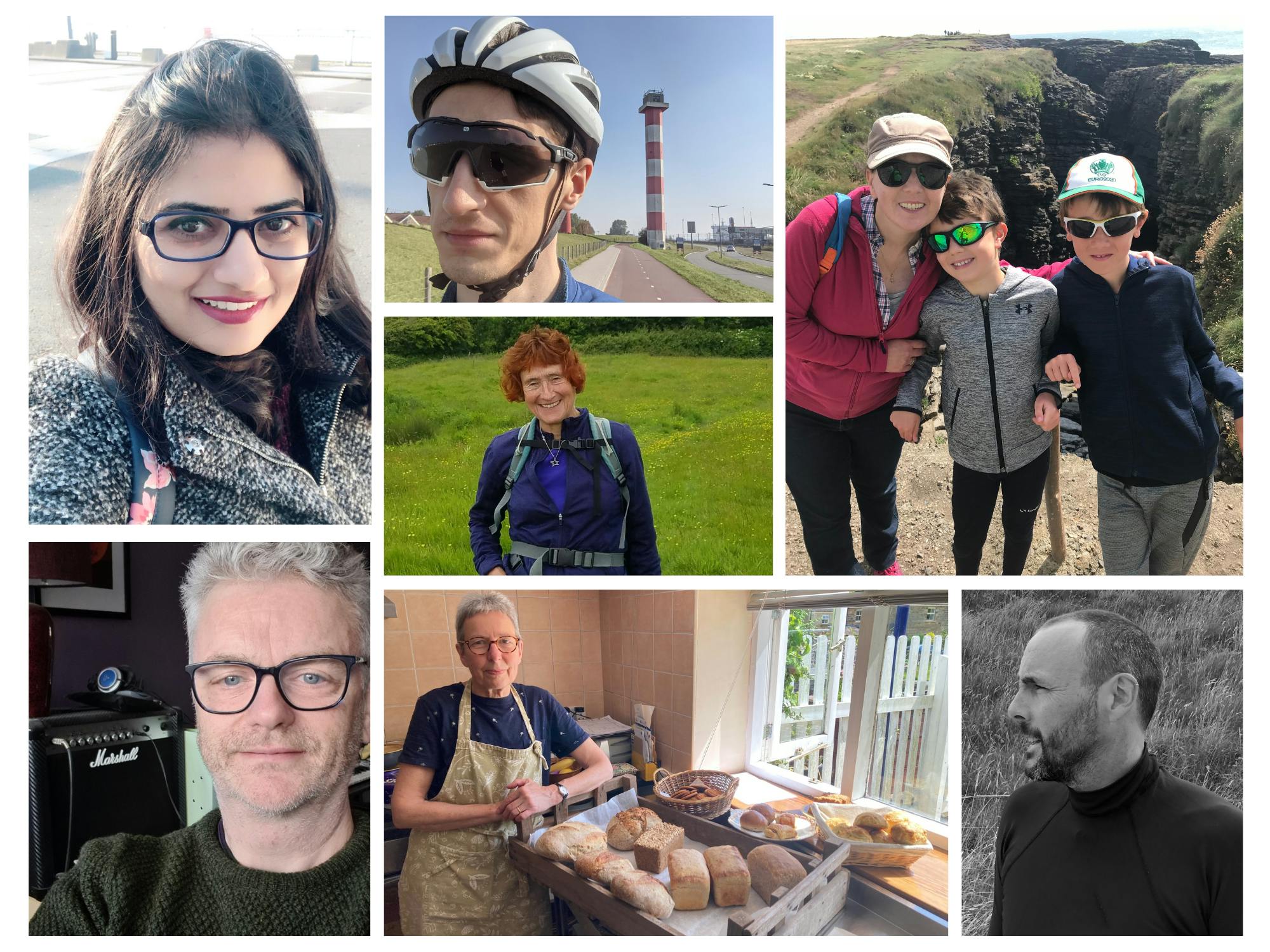Meet the Money Movers
Updated November 29, 2023 by Neil Simpson
Are you hesitant to move your money out of fossil fuels? Nervous to fiddle with your finances? Think it will take ages and your bank will make it difficult to leave? Well, you're not alone.
We've been talking to people from various countries who have taken action after discovering their money was supporting fossil fuels. How did they find the bank-switching process? Do they like their new bank? Any advice for prospective switchers? Find out below – we hope their insights inspire you.

David, UK
Soon after David signed the Bank.Green pledge, life got busy and he delayed his money move. But he didn't forget: "When I actually pulled the trigger and started the process off, it was actually a lot less difficult than I imagined."
David moved his Santander current (checking) account to Triodos UK. "I got a letter of confirmation from Santander", he says, "but they didn't throw up any obstacles or difficulties at all."
As for Triodos, David rates the bank highly:
"I think you don't necessarily get all of the additional features that you might get with one of the bigger banks. We were getting a bit of interest on our Santander account and now we're not getting that. But the Triodos website and app are pretty good and improving all the time. Once you get over the initial hump of changing, of getting used to a new website and app, it's really more or less the same.
"I remember changing banks when I was younger: It was really quite a difficult, painful process. Lots of form-filling and you'd have to provide all the details to the new bank to set up direct debits and standing orders. Now that process is automated.
"I definitely feel much better knowing that our money is in a place where it's going to be used more responsibly. Don't be afraid of taking the plunge – just go for it."

Fiona, Ireland
In 2021, Ulster Bank announced its withdrawal from the Republic of Ireland. Fiona admits that switching banks "seemed daunting", but she had already discovered that Ulster was arranging finance for fossil fuels and says the bank's closure "took me over the edge".
Fiona's first step was to rule out Ireland's other fossil banks, going as far as contacting Bank of Ireland and Allied Irish Bank to tell them why she wouldn't choose them.
Unfortunately, Fiona's bank move was time-consuming because it wasn't automated by either party, but she nevertheless considered it to be a worthwhile, "one-off thing". Fiona now has an An Post Money account and a Tomorrow card:
"The An Post account actually was a little bit cheaper [than Ulster Bank] in terms of charges. I just got a debit card with Tomorrow that I use for shopping, but that's worked out really well; it rounds up your transactions and the extra money goes towards different sustainability projects. Tomorrow genuinely is a sustainable bank, which just feels great. And the app that they have and the services that they provide are just as good as any other bank."

Steven, UK
The Co-operative Bank has handled Steven's personal accounts for 20 years, but he was using Barclays business accounts for his two companies.
Barclays is Europe's number one fossil fuel bank. "The minute you know that, if you're a conscious person... I couldn't ignore it any longer" says Steven. "All the small things we do to contribute towards sustainability and against climate change pale into insignificance when it comes down to how you manage your money, what bank it's in and how it's spent on your behalf.
“I always knew Barclays was bad. Being 50, I remember its connection to apartheid in the 70s and 80s. It wasn't rocket science to understand that Barclays is bad, but it was the only bank that would initially give me a business account for our companies.”
Steven now has business accounts with both Starling and the Co-operative Bank, a transition he describes as "pretty damn seamless", adding: "We have about 100 different suppliers set up on our system and I thought I'd have to write off a week to sort it out, but it was only half a day's work, if that.
"It was just easy. I can't believe more people don't do it more regularly, purely if they're not happy with the service they're getting, let alone because of climate change."

Swapna, UK
In December 2021, Swapna was "really upset" after finding out that her bank, HSBC, was investing heavily in fossil fuels. Swapna moved her current accounts to Monzo in January 2022, followed by her HSBC savings account to Nationwide in November.
Although each of these individual switches was "really easy and quick", Swapna conducted the move in stages because she was applying for a mortgage and had learnt that opening new banks accounts could lower her credit score (she waited until her mortgage was approved before opening her Nationwide account). According to an online tool, Swapna's credit score has since dropped by 16 points out of a possible total of 710.
Overall, Swapna is philosophical about these changes. "It's up to a person's individual mentality; what they find more important in a bank account", she says. "We have a child now and we think about everything. What are we going to do for our child, beyond providing food? That's what I ask my friends all the time: If there's no planet to live on, what will you do with money?"

Caroline, UK
Environmental activist Caroline moved her money from Barclays to Nationwide, setting up a savings and a current (checking) account. She also opened a savings account with Triodos UK. Initially sceptical of the bank's online-only structure, Caroline says "they actually responded very quickly in answering the phone and were terribly helpful".
Caroline used the reminder function on our Pledge page to kickstart her money move: This reminder is an automated email with bank-switching info, which you can schedule to land in your inbox at the most convenient time.
Caroline describes her money moves as "pretty straightforward". She also opted to confront her old bank (as detailed in our Take action resources):
"I went into Barclays and said 'I would like to write a letter to the chief executive; what's his name and address?' I didn't want to send an email, because somebody would just look at that; I wanted to write a letter. It said: 'You are the worst bank for fossil fuel investment in Europe and the seventh-worst in the world. It's about time you stopped investing in fossil fuels. I've been one of your customers for a very long time but I'm going to take my money elsewhere!'"

Harley, Netherlands
Harley had only ever banked with Santander in England – until he watched What Your Bank Really Does With Your Money by Climate Town.
Choosing Nationwide, Harley describes the transition process as "pain-free": "There's nothing that Santander do that Nationwide don't."
As it's a building society (which is similar to a credit union), Nationwide doesn't arrange financing for the fossil fuel industry. But neither does it proactively engage with sustainable enterprises. As such, Harley would ultimately like to move his money to a sustainability-first bank, but he's a full-time student and the associated fees deterred him (for example, Triodos UK charges a monthly £3 account maintenance fee*).
Now living in the Netherlands, Harley also has an account with the Dutch bank ASN: "They don't have a high street presence, which is fine for me. I've become increasingly used to app-based banks, like Monzo, and they're fine.
"I don't have any money that's being invested in anything I really disagree with", says Harley. "That gives me peace of mind, which is really significant, especially when climate anxiety is increasingly a problem, I think, for many people [...] There will be many, many people out there like myself who have chosen that and eventually the banks will take note."
Harley says moving your money is "much easier than it sounds". His advice is to set your banking criteria and concentrate on finding it, because "if you go out there not really knowing what you're looking for, you're more likely to meet problems and give up".
* Why do some sustainable banks charge universal account maintenance fees? Find out in our FAQ section.

Maggie, UK
It was "pure sentiment" that stopped Maggie from leaving Lloyds, a fossil fuel-financing bank that her husband once worked at. But she says that reading a Bank.Green email was "the last straw... I knew I had to do it."
Moving her current account from Lloyds to Nationwide was "easy", but Maggie still has another Lloyds account that's essential to the running of her bakery business. This account enables her to deposit cash at her local village Post Office; the alternatives would either charge Maggie every time, or necessitate a trip into town.
This unresolved issue aside, Maggie is happy with her new Nationwide current account. "I think we need to operate in line with our heart and our ethics; in what we believe is right and wrong", she says. "It's way too easy to just perpetuate our habits because it might make life simpler in various ways, like not having to drive 20 miles to pay in some cash. But actually, we've got to look for that simplicity in a different way, in not being conflicted in our hearts."
Tell Us About Your Money Move
If we have inspired you – or anybody you know – to move money out of a fossil-financing bank, please consider taking a few minutes to complete our new survey. Your answers will help us to build a clearer picture of Bank Green’s impact, which in turn grants us more power in the push for change.
Simply visit bank.green/impact. Thank you!
Start to Bank Green Today
Banks live and die on their reputations. Mass movements of money to fossil-free competitors puts those reputations at grave risk. By moving your money to a sustainable financial institution, you will:
Send a message to your bank that it must defund fossil fuels
Join a fast-growing movement of consumers standing up for their future
Take a critical climate action with profound effects